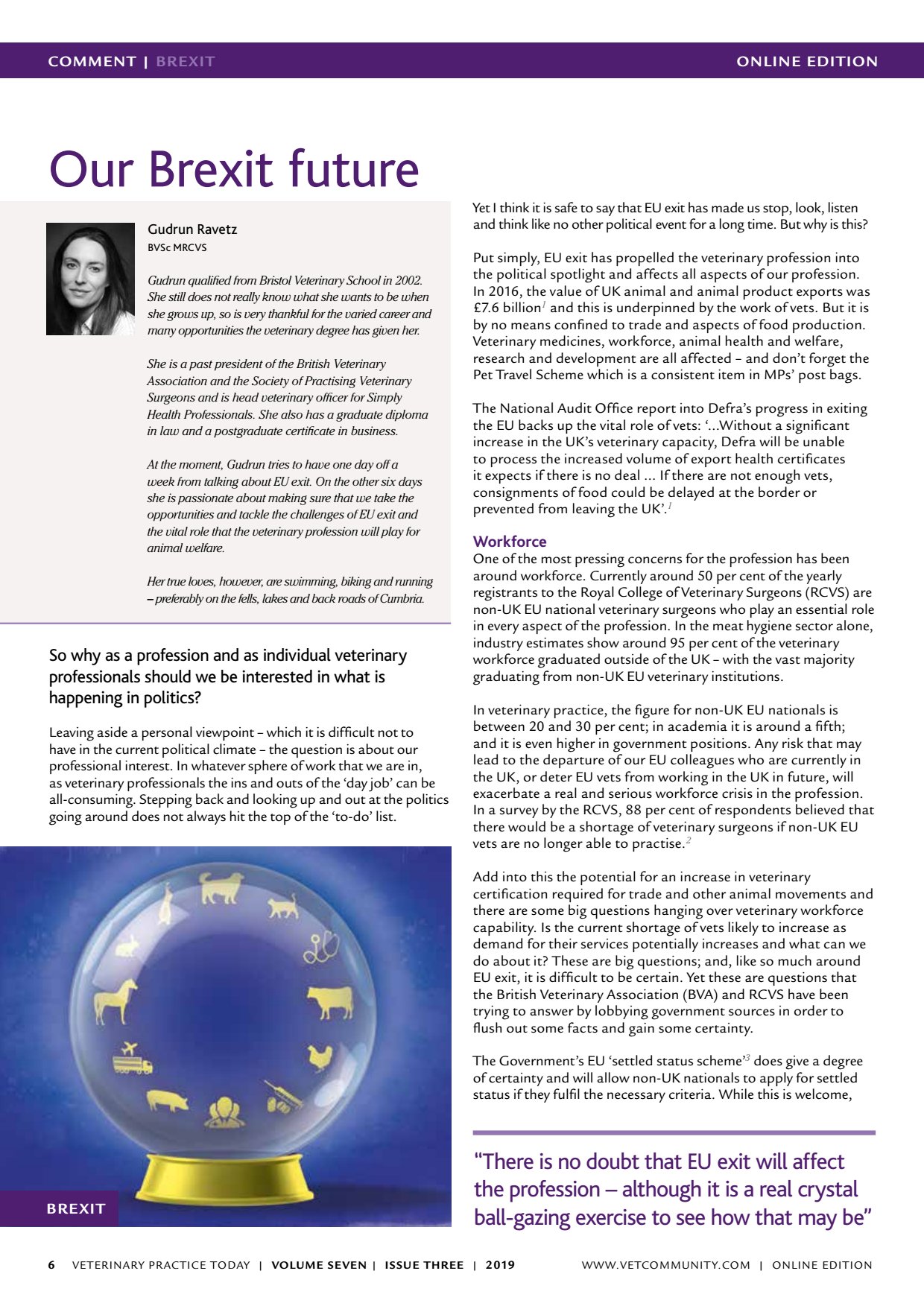Brexit future Workforce
CAREERS 6 ONLINE EDITION VETERINARY PRACTICE TODAY | VOLUME SEVEN | ISSUE THREE | 2019 OMMENT | BREXIT WELFARE Our Brexit future So why as a profession and as individual veterinary professionals should we be interested in what is happening in politics? Leaving aside a personal viewpoint which it is difficult not to have in the current political climate the question is about our professional interest. In whatever sphere of work that we are in, as veterinary professionals the ins and outs of the day job can be all-consuming. Stepping back and looking up and out at the politics going around does not always hit the top of the to-do list. Yet I think it is safe to say that EU exit has made us stop, look, listen and think like no other political event for a long time. But why is this? Put simply, EU exit has propelled the veterinary profession into the political spotlight and affects all aspects of our profession. In 2016, the value of UK animal and animal product exports was 7.6 billion 1 and this is underpinned by the work of vets. But it is by no means confined to trade and aspects of food production. Veterinary medicines, workforce, animal health and welfare, research and development are all affected and dont forget the Pet Travel Scheme which is a consistent item in MPs post bags. The National Audit Office report into Defras progress in exiting the EU backs up the vital role of vets: Without a significant increase in the UKs veterinary capacity, Defra will be unable to process the increased volume of export health certificates it expects if there is no deal If there are not enough vets, consignments of food could be delayed at the border or prevented from leaving the UK. 1 Workforce One of the most pressing concerns for the profession has been around workforce. Currently around 50 per cent of the yearly registrants to the Royal College of Veterinary Surgeons (RCVS) are non-UK EU national veterinary surgeons who play an essential role in every aspect of the profession. In the meat hygiene sector alone, industry estimates show around 95 per cent of the veterinary workforce graduated outside of the UK with the vast majority graduating from non-UK EU veterinary institutions. In veterinary practice, the figure for non-UK EU nationals is between 20 and 30 per cent; in academia it is around a fifth; and it is even higher in government positions. Any risk that may lead to the departure of our EU colleagues who are currently in the UK, or deter EU vets from working in the UK in future, will exacerbate a real and serious workforce crisis in the profession. In a survey by the RCVS, 88 per cent of respondents believed that there would be a shortage of veterinary surgeons if non-UK EU vets are no longer able to practise. 2 Add into this the potential for an increase in veterinary certification required for trade and other animal movements and there are some big questions hanging over veterinary workforce capability. Is the current shortage of vets likely to increase as demand for their services potentially increases and what can we do about it? These are big questions; and, like so much around EU exit, it is difficult to be certain. Yet these are questions that the British Veterinary Association (BVA) and RCVS have been trying to answer by lobbying government sources in order to flush out some facts and gain some certainty. The Governments EU settled status scheme 3 does give a degree of certainty and will allow non-UK nationals to apply for settled status if they fulfil the necessary criteria. While this is welcome, There is no doubt that EU exit will affect the profession although it is a real crystal ball-gazing exercise to see how that may be Gudrun Ravetz BVSc MRCVS Gudrun qualified from Bristol Veterinary School in 2002. She still does not really know what she wants to be when she grows up, so is very thankful for the varied career and many opportunities the veterinary degree has given her. She is a past president of the British Veterinary Association and the Society of Practising Veterinary Surgeons and is head veterinary officer for Simply Health Professionals. She also has a graduate diploma in law and a postgraduate certificate in business. At the moment, Gudrun tries to have one day off a week from talking about EU exit. On the other six days she is passionate about making sure that we take the opportunities and tackle the challenges of EU exit and the vital role that the veterinary profession will play for animal welfare. Her true loves, however, are swimming, biking and running preferably on the fells, lakes and back roads of Cumbria. BREXIT WWW.VETCOMMUNIT Y.COM | ONLINE EDITION
